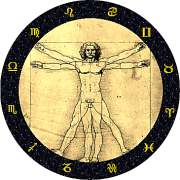Weboteric - Astrology
|
 |

Astrology - Mars
The God of War
Portending conflict, the red planet whose canals were ruled by the beautiful princesses of Barsoom.
Its symbol represents the cross of matter exalted over the circle of spirit but directed (to where?)
Mythology
Mars has been known from earliest times as the red planet.
The Egyptians called it Harmakis, the Babylonians Nergal and the Greeks knew it as Ares, the God of War, son of Zeus and Hera.
Ares did not marry but had three children by Aphrodite - the Goddess of Love. Two of the children, the twins Phobos (panic) and Deimos (fear) accompanied him into battle.
The god was renamed Mars by the Romans who adopted him into their pantheon of gods.
In recent times Mars has acquired its own Mythos with the 'discovery' of canals - which sadly do not really exist - and tales of Barsoom by Edgar Rice Burroughs.
The modern mystery is the existence of life on Mars and if the famous Viking photograph of a face and pyramids is real or the result of computer processing.
Effects of Mars
Astrologically Mars is seen as THE EGO in action, the aggressive planet which causes divisions and splits between mankind but is the giver of courage and physical energy.
The risk taker with an idominitable will to succeed.
The purveyor of the seemingly opposing paths of creation and destruction. In Mars we find great physical energy and the symbolism of fighting, argument, hostility and hot-headed action.
It represents soldiers and weapons, in fact any cutting implement, and so associates with surgeons and blood. It is a planet of boldness, courage, competitiveness and connects with violence, anger and murder. Mars represents passion, desire, energy, assertiveness, courage and initiative. Its action is to energise, stimulate, inflame, intensify and aggravate.
How Mars will manifest its energy, the force of life and creator of matter out of spirit, depends on the horoscope as a whole. The Sign (and its Element), the House in which if falls, and the Aspects to the other planets will all have a bearing on any interpretation.
Mars represents drive and masculinity, as well as issues connected with sexuality and power. It indicates the work we choose and the way we approach it. Mars is strongly associated with the experience of brothers, the father and men in general.
Where Mars is there is trouble, but also the fighting instinct to get on in life. Mars shows challenges and the ability to meet them bravely. Mars is connected with the muscular system.
The Sign Mars is in represents the particular psychological area in which we express our energy. Mars takes 2 years to go around the Sun, as it is in each sign for approximately 2 months. In a woman's horoscope it represents the type of men she is attracted to, in a man's his own attitude to men, competitiveness and masculinity.
The House Mars is in shows the specific area in which one desires to invest energy. This house will also show where one is most dynamic, where men are encountered, and where one is confronted with issues of power.
Aspects to Mars show specific attractions to men, or specific sexual preferences. They show the way we use our energy and special talents for particular kinds of work
Mars Key Facts |
|
Rules: |
|
Detriment: |
|
Exhalt: |
|
Fall: |
|
Colours: |
Red and scarlets, dark browns |
Stones & Metals: |
Bloodstone, malachite, flint, iron and steel |
Keywords: |
Creation and Destruction |
Astronomy
Mars is the 4th planet from the sun and has an atmosphere which is extremely thin. This moderates the temperature which ranges from -87°C to as high as 17°C.
The surface shows signs of past volcanic activity and probably the results of free water in the past. The ice-caps that change with the Martian seasons are probably composed mainly of frozen carbon dioxide (dry ice) rather than water.
Daylength (rotation) |
24.6 Hours |
Year length |
1.88 Years |
Distance from the sun (average) |
141.6 million miles (227.9 Million KM) |
Distance from Earth (shortest) |
34.6 million miles (55.7 Million KM) |
Distance from Earth (greatest) |
248 million miles (399 Million KM) |
Size (Earth=1) |
0.53 |
Mass (Earth=1) |
0.11 |
No of moons |
Two |


Copyright © Weboteric.com 2006 Webdesign by WebOneUK